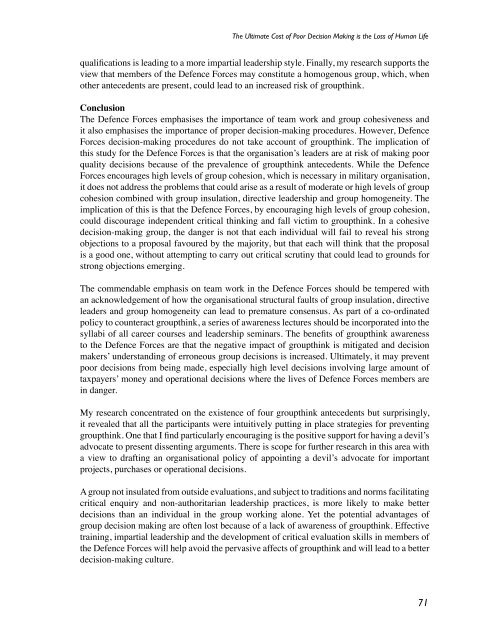Defence Forces Review 2010
Defence Forces Review 2010
Defence Forces Review 2010
Create successful ePaper yourself
Turn your PDF publications into a flip-book with our unique Google optimized e-Paper software.
The Ultimate Cost of Poor Decision Making is the Loss of Human Lifequalifications is leading to a more impartial leadership style. Finally, my research supports theview that members of the <strong>Defence</strong> <strong>Forces</strong> may constitute a homogenous group, which, whenother antecedents are present, could lead to an increased risk of groupthink.ConclusionThe <strong>Defence</strong> <strong>Forces</strong> emphasises the importance of team work and group cohesiveness andit also emphasises the importance of proper decision-making procedures. However, <strong>Defence</strong><strong>Forces</strong> decision-making procedures do not take account of groupthink. The implication ofthis study for the <strong>Defence</strong> <strong>Forces</strong> is that the organisation’s leaders are at risk of making poorquality decisions because of the prevalence of groupthink antecedents. While the <strong>Defence</strong><strong>Forces</strong> encourages high levels of group cohesion, which is necessary in military organisation,it does not address the problems that could arise as a result of moderate or high levels of groupcohesion combined with group insulation, directive leadership and group homogeneity. Theimplication of this is that the <strong>Defence</strong> <strong>Forces</strong>, by encouraging high levels of group cohesion,could discourage independent critical thinking and fall victim to groupthink. In a cohesivedecision-making group, the danger is not that each individual will fail to reveal his strongobjections to a proposal favoured by the majority, but that each will think that the proposalis a good one, without attempting to carry out critical scrutiny that could lead to grounds forstrong objections emerging.The commendable emphasis on team work in the <strong>Defence</strong> <strong>Forces</strong> should be tempered withan acknowledgement of how the organisational structural faults of group insulation, directiveleaders and group homogeneity can lead to premature consensus. As part of a co-ordinatedpolicy to counteract groupthink, a series of awareness lectures should be incorporated into thesyllabi of all career courses and leadership seminars. The benefits of groupthink awarenessto the <strong>Defence</strong> <strong>Forces</strong> are that the negative impact of groupthink is mitigated and decisionmakers’ understanding of erroneous group decisions is increased. Ultimately, it may preventpoor decisions from being made, especially high level decisions involving large amount oftaxpayers’ money and operational decisions where the lives of <strong>Defence</strong> <strong>Forces</strong> members arein danger.My research concentrated on the existence of four groupthink antecedents but surprisingly,it revealed that all the participants were intuitively putting in place strategies for preventinggroupthink. One that I find particularly encouraging is the positive support for having a devil’sadvocate to present dissenting arguments. There is scope for further research in this area witha view to drafting an organisational policy of appointing a devil’s advocate for importantprojects, purchases or operational decisions.A group not insulated from outside evaluations, and subject to traditions and norms facilitatingcritical enquiry and non-authoritarian leadership practices, is more likely to make betterdecisions than an individual in the group working alone. Yet the potential advantages ofgroup decision making are often lost because of a lack of awareness of groupthink. Effectivetraining, impartial leadership and the development of critical evaluation skills in members ofthe <strong>Defence</strong> <strong>Forces</strong> will help avoid the pervasive affects of groupthink and will lead to a betterdecision-making culture.71
















